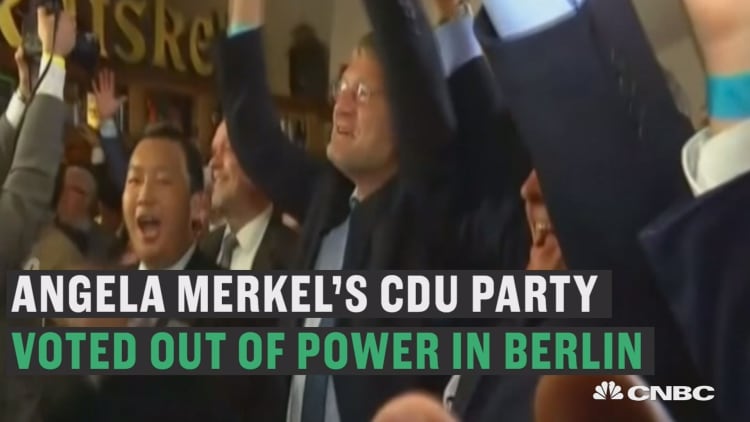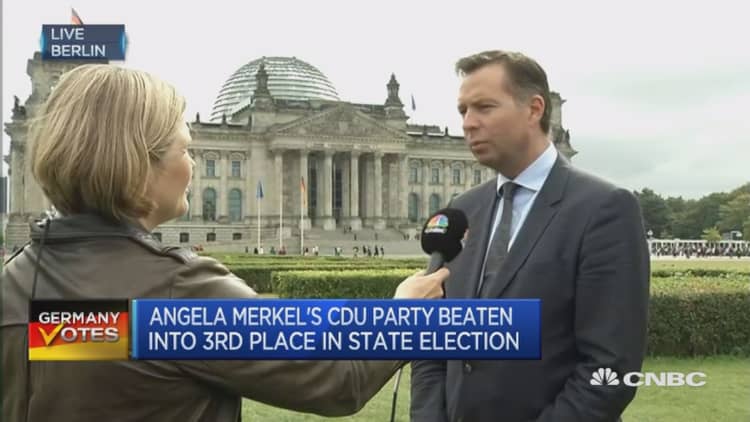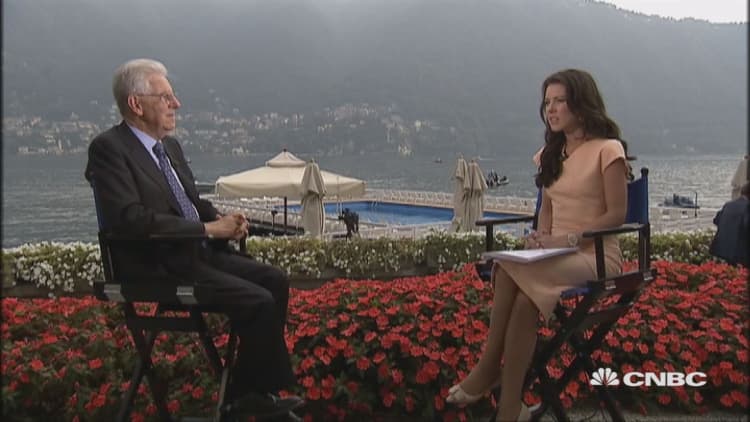
The drubbing at the polls received by German Chancellor Angela Merkel's party over the weekend reflects Europeans' growing distain for their established political parties, experts warn.
Only 17.6 percent of Berliners voted for Merkel's CDU in this week's elections, while the relative newcomer of the anti-immigration AfD gained 14.1 percent. The Social Democrats came in first, as expected, with 21.6 percent of the vote.
With German federal elections slated for next year, there is a rising chance that the next government will be a three-party coalition with the far-right AfD, according to the chief economist of ING-DiBA.
"Given the new — mildly put — challenging environment and increased unrest in Germany's government, politics will remain at center stage in the coming months," Frankfurt-based Carsten Brzeski said in a note on Monday.
Merkel's waning popularity is in part due to her open-door policy towards refugees fleeing the carnage in Syria and Iraq. Consequently, German net immigration reached a record high of 1.139 million last year. Even Merkel's sister party, the CSU, is demanding controls on Germany's annual refugee intake.

Echoes across Europe
These immigration concerns are echoed in political unrest in other parts of Europe. A desire for the U.K. to control its own borders and immigration policy was one reason the majority of Britons voted to quit the EU in June.
Next month, Hungary will hold its own referendum on whether to abide by EU quotas for accepting refugees. On Monday, hardline Hungarian Prime Minister Viktor Orbán called for EU military cooperation to control the flow of migrants into the region, according to media reports.
Back in 2014, Switzerland voted by a slim margin to impose quotas on inward migration, in a referendum pushed for by right-wing populists. This put the country at odds with the EU, which insisted that free movement of people was part of the deal that allowed Switzerland preferential access to the single market. The situation is yet to be resolved.
Across Europe, there are a multitude of other votes coming up. Not all elections in the region have heralded instability however. On Sunday, Vladimir Putin's party gained a large majority in parliamentary elections, pathing the way for Putin to run again as president in 2018, if he chooses.
Uncertainty in Italy
Less smooth running could be Italy's upcoming referendum on constitutional reform, on which Prime Minister Matteo Renzi has staked his political future.
"November has the potential to reintroduce the specter of political uncertainty in Italy," UBS strategists led by Lefteris Farmakis said in a report earlier this month.
"Polling evidence regarding the referendum outcome is inconclusive at a time that the anti-establishment 5-Star Movement has become a serious challenger to the ruling PD."
UBS said Italian bond yields were too low to accurately reflect the political risk from Italy's upcoming constitutional referendum. Italian 10-year bond yields have widened over the last two weeks, but pared back slightly on Monday, trading at 1.31 percent.

Austria and Spain signal upset
Meanwhile, a re-run of Austria's presidential election was set for October 2, but was postponed due to faulty seals on postal ballots. This could be another destabilizing vote, with the far-right anti-migrant Freedom Party ahead in recent polls.
Plus, Spain faces a third election this year, as acting Prime Minister Mariano Rajoy struggles to gain enough votes to form a government.
Against this uncertainty, EU policymakers are struggling to draw a clear picture of the bloc's future post-Brexit. Italy's Renzi took to the Corriere della Sera newspaper on Sunday to complain after last week's EU summit in Slovakia.
"At Bratislava we had a nice cruise on the Danube, but I hoped for answers to the crisis caused by Brexit … not just to go on a boat trip," Renzi said, according to media reports.
Barclays's chief economist for Europe, the Middle East and Africa, said the EU was suffering from uncertainty in how to respond to the Brexit vote.
"Our view is that the Bratislava roadmap clearly lacks ambition and reflects the divergence of views among member states on the response to the risk of disintegration following the Brexit vote. This, together with the conjunction of political challenges in some important member states, may contribute to a rise in uncertainties regarding the future of Europe and therefore a weakening of business confidence," Philippe Gudin, said in a report on Monday.

